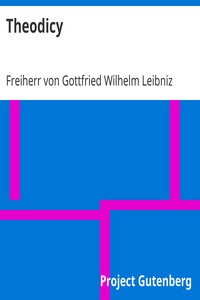Theodicy by Freiherr von Gottfried Wilhelm Leibniz
"Theodicy" by Freiherr von Gottfried Wilhelm Leibniz is a philosophical work published in 1710. Leibniz confronts Pierre Bayle's arguments that no rational explanation exists for why God permits evil. He proposes that an infinitely perfect God must have created "the best of all possible worlds," with the greatest balance of good over evil. Distinguishing between moral, physical, and metaphysical evil, Leibniz defends divine goodness, justice, and freedom while reconciling human free will
with God's foreknowledge. (This is an automatically generated summary.)
Read or download for free
| How to read | Url | Size | |||
|---|---|---|---|---|---|
| Read now! | https://www.gutenberg.org/ebooks/17147.html.images | 1.2 MB | |||
| EPUB3 (E-readers incl. Send-to-Kindle) | https://www.gutenberg.org/ebooks/17147.epub3.images | 492 kB | |||
| EPUB (older E-readers) | https://www.gutenberg.org/ebooks/17147.epub.images | 510 kB | |||
| EPUB (no images, older E-readers) | https://www.gutenberg.org/ebooks/17147.epub.noimages | 509 kB | |||
| Kindle | https://www.gutenberg.org/ebooks/17147.kf8.images | 835 kB | |||
| older Kindles | https://www.gutenberg.org/ebooks/17147.kindle.images | 770 kB | |||
| Plain Text UTF-8 | https://www.gutenberg.org/ebooks/17147.txt.utf-8 | 1.1 MB | |||
| Download HTML (zip) | https://www.gutenberg.org/cache/epub/17147/pg17147-h.zip | 474 kB | |||
| There may be more files related to this item. | |||||
Similar Books
About this eBook
| Author | Leibniz, Gottfried Wilhelm, Freiherr von, 1646-1716 |
|---|---|
| Commentator | Farrer, Austin, 1904-1968 |
| Translator | Huggard, E. M. |
| Title |
Theodicy Essays on the Goodness of God, the Freedom of Man and the Origin of Evil |
| Note | Wikipedia page about this book: en.wikipedia.org/wiki/Th%C3%A9odic%C3%A9e |
| Credits |
Produced by John Hagerson, Juliet Sutherland, Keith Edkins and the Online Distributed Proofreading Team at www.pgdp.net |
| Reading Level | Reading ease score: 59.6 (10th to 12th grade). Somewhat difficult to read. |
| Language | English |
| LoC Class | BT: Philosophy, Psychology, Religion: Christianity: Doctrinal theology, God, Christology |
| Subject | Theism |
| Subject | Theodicy |
| Subject | Free will and determinism |
| Category | Text |
| EBook-No. | 17147 |
| Release Date | Nov 24, 2005 |
| Most Recently Updated | Dec 13, 2020 |
| Copyright Status | Public domain in the USA. |
| Downloads | 1836 downloads in the last 30 days. |
| Project Gutenberg eBooks are always free! | |

